-
Genealogy & Names
-
Tourist Information
-
Culture & Reference
1798 Rebellion
Dermot, Strongbow and the Invasion of Ireland
The Titanic and Ireland
The Vikings in Ireland
The Ancient Ogham language
Padraig Pearse
Countess Markievicz
Saint Patrick
Saint Brigid
Robert Emmet
Kevin Barry
Michael Collins
Eamon deValera
Sean Lemass
Daniel O'Connell
Charles Stewart Parnell
Wolfe Tone
Brian Boru
Grace O'Malley
James Connolly
Irish Stamps
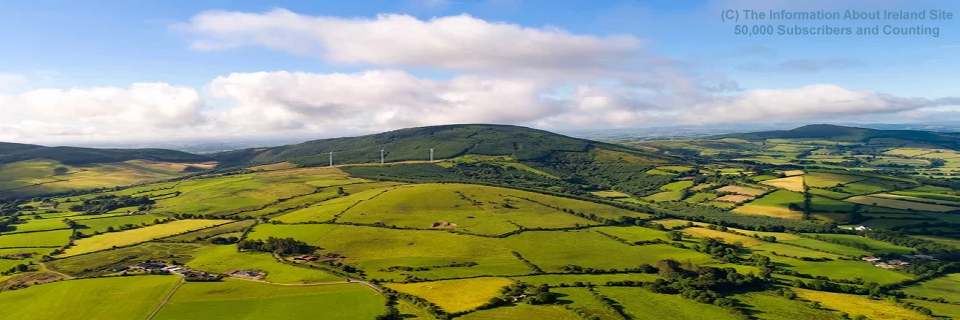
|
IN THIS ISSUE

This month we have a reminisce of Ireland in the 1950's, some more funny quotes and a study of Erskine Childers, the fourth President of Ireland. If you have an article or story you would like to share then please do send it in. Until next time, Michael 
P.S. Please Do Forward this Newsletter to a friend or relative. If you have a website or Facebook page or Blog (or whatever!) then you can help us out by putting a link on it to our website: www.ireland-information.com
|
||||||||||||||||||||||||


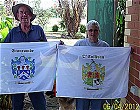
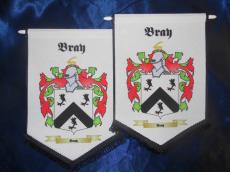
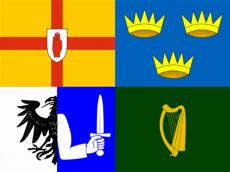
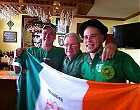
find out more |


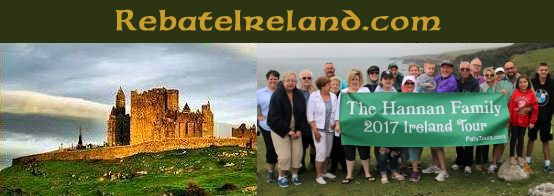
If you are involved in a Non-profit, a Family Gathering, a Church Group, or any kind of organization that has considered Touring Ireland then we can help. Our program allows groups like yours to experience the best of the Emerald Isles at competitive rates. While still being a substantial fundraiser! By participating in our 'Rebate Program' you can get a competitive group tour package and earn between US$4,000 and US$11,000 per group tour. And all without raising the traveler’s cost per tour! Interested? Well, It costs nothing to find out more. Visit this web page and complete the simple online form: https://tourismirelandgrouprebateprogram.com Or you can call us direct at +353 76 88 87066 (from USA dial 011-353-76-88-87066) and you can decide if this program is right for you. Please do mention the 'Ireland Newsletter' when you call! |

CRITICISM OF 'SAY NOPE TO THE POPE' PROTEST Pope Francis is due to arrive in Ireland this August with a mass to be held at Phoenix Park in Dublin and a visit to the shrine at Knock in Mayo among the highlights of his visit. The event is a nearly booked out with 400,000 of the free tickets being snapped up in record time. 
However there is a growing protest movement developing on Social Media called 'Say Nope to the Pope' that has claimed to have booked hundreds or even thousands of tickets that they plan not to use and are encouraging their supporters to book as many tickets as possible with the intention of not using them. The Facebook campaign has drawn heavy criticism including remarks from Taoiseach Leo Varadkar who described their campaign as 'petty and mean-spirited', a comment that Protester Richard Duffy rejected: 'A number of people have described this protest as 'petty'. I feel that describing any action taken against the abuses of the church as 'petty' is shameful.' RADICAL OVERHAUL TO DUBLIN BUS SERVICE PLANNED A major overhaul of the Dublin bus transport network is being planned that could greatly improve the efficiency of the service and reduce travel times. Bus frequency of 8 minutes and 15 minutes are being proposed for what would be the most radical shake-up of the service in decades. The plan is another boost for commuters after the recent announcement that the long-awaited Dublin Metro links will actually go ahead. The network will include a train service to Dublin Airport from the city centre, which incredibly, the capital city does not yet have. The development is to be completed by 2027 at an estimated cost of 3 Billion Euro. IRISH ECONOMY APPROACHING FULL EMPLOYMENT It is quite the turnaround in the Irish economy that has seen unemployment drop to 5.1% in June 2018. This is a spectacular decline from the near 16% in 2012 - just 6 years ago. The last time Irish unemployment was 5.1% was in October 2007, just before the economic crash that devastated the country. TOURISM AWARDS FOR IRISH HOTELS The Sandymount Hotel in Dublin has been named 'Europe's Leading Green Hotel' at the World Travel Awards in Athens while the Jameson Distillery at Bow Street has been voted 'Europe's Leading Distillery Tour' for 2018. The Dublin Convention Centre on the banks of the River Liffey was voted 'Europe's Leading Meetings & Conference Centre'. Portugal was named as 'Europe's Leading Destination' at the prestigious award ceremony. |

FIND YOUR NAME IN OUR GALLERY OF IRISH COATS OF ARMS

|

|

HELP KEEP THIS NEWSLETTER ALIVE!
|
||||

by Michael Collins The wheelchair was uncomfortable and the retirement home smelt musty. Martin settled himself into the seat as best he could, trying to find the most favourable position for his withered and bony bottom and thighs. Ahead of him stretched another long day of inactivity. Since the stroke had paralysed his body but had left his mind intact he had had a long string of such days. Make the best of it, he thought. Use your mind. Think long and hard of good things and bad things. Spin the day out. So what's today's story that I'm going to re-tell myself? What about the inheritance I never had? That's the one. He started to call up memories... 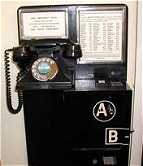 February was always cold. Outside, on that early morning in 1954, it had been damp and bone-chilling.
February was always cold. Outside, on that early morning in 1954, it had been damp and bone-chilling.
Martin ran the four hundred yards through the mist to the phone box. He never walked when he could run, never ran when he could sprint. His Dad had got him out of bed while his nose was just about sticking out from under the counterpane, the ice flowers thick on the bedroom window. He emerged from the warm covers reluctantly, washed and dressed briefly. Downstairs he found his father doing what Martin himself most enjoyed doing in the morning: laying the fire in the tiny grate. His father hushed his protests: 'I know,” and pressed two pennies into his hand, 'but I want you to run to the phone to find out how your Grandma is.” Inside the red phone box he got his breath back. Lift the receiver and insert two pennies. Dial the number. 'Hello. Warburton Hospital', said a voice. He pressed button A. 'Hello. Could you please tell me how Mrs Cotton is, ward sixteen?' Unexpectedly the speaker asked who was making the enquiry. The lad stammered, explaining that he was her grandson and that, er, my Dad had asked me to call... His voice trailed off. 'Just a second son', said the friendly voice. 'I'll try to find out.' He hoped that his two pennies would last. The voice asked him if he was still there. He confirmed his presence. 'And how old are you?' 'Almost fourteen.' 'Then you'll have to be a brave lad. I'm afraid your gran died in the night. Can you tell your Dad to phone us immediately?' He started to shiver. He would have to tell his Dad that his Mum had died. He was still trembling with apprehension when the kindly voiced asked him again if he was still on the line. He nodded silently, then realised how stupid that was, glad that nobody could see him do something so daft. He answered quietly that he was still there. 'Did you understand what I said?' 'You said my Grandma had died, didn't you?' 'I'm afraid so, yes.' He replaced the receiver, feeling as cold and dark within as the morning without. Time was getting on. He had to catch the bus to school, but he trudged home unwillingly, shivering inside and out. He had no key to the front door so he just stood there, paralysed and scared to knock. But his Dad had heard him coming. The door swung open. 'What...' he began to say. Then he saw the lad's face. He put an arm around his shoulder. 'Come on in, son. The tea's brewed and I've got some toast going.' They sat at the table with their tea and toast and jam. 'She's dead, isn't she.' It was a statement, not a question. The boy nodded. 'It's not your fault, son. Drink your cuppa and get some toast down you. Then you can get off to school. I'll take the day off and get things seen to.' He had remembered very little of the rest of the week except that he started having thoughts that made him feel guilty. Now he would get Grandma's gramophone and the Paul Robeson records. And one of his sisters would probably get the treadle sewing machine. There also seemed to be some tension between Mum and Dad. Not a row: they never rowed. Just something they couldn't talk to the kids about. They never had done, though he had been aware of tensions in that area from an early age. Kids feel it, pick it up as if they have a sensitive antenna. Grandma Cotton had come across to the grandchildren as an embittered old lady with a sharp tongue. Sunday afternoon visits to her had been no fun, except that she allowed Martin to play her old records on her wind-up gramophone. They didn't have one at home but even then he had been crazy about music. And having no concept of how the sound was produced he had invented a fantasy world in which the gramophone sent out a secret message to the singer who would then perform for him alone. Only faint twinges of doubt arose when he had learned that some of the performers were dead. Anyway, Grandma was now to be buried and he would get the gramophone she had always promised him. After the funeral they had gone home in an unaccustomed taxi. Mum brewed tea and made some sandwiches. They all ate in silence for a while. Then, emboldened by the fact that his Dad had, after all, not been mad at him when he had told him his Mum was dead, he asked the question that had been burning in his mind since that cold morning a week before. 'Can I have Grandma's gramophone now she's dead?' Mum and Dad exchanged quick glances. Dad had looked at him and said quietly: 'I'm sorry, son, but the gramophone's gone.' 'Gone? Where to? Who's got it?' his questions tumbled out in a fluster. 'It's a bit difficult to explain', he replied, again quietly, but gave no further explanation. 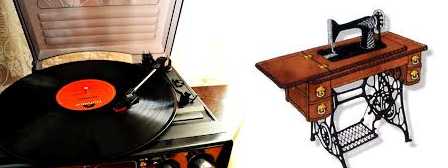 The lad thought he had got the message. He had asked the wrong question. His wish had been grossly out of order. He should have been grieving for a lost Grandma and here he was moaning about a stupid gramophone.
The lad thought he had got the message. He had asked the wrong question. His wish had been grossly out of order. He should have been grieving for a lost Grandma and here he was moaning about a stupid gramophone.
The years passed. Dead Grandma Cotton was scarcely mentioned, if at all. He had grown up, become what he considered to be a man, and had thought no more about his Grandma's gramophone. Except once when, in the attic of a building he had been working in, he discovered exactly the same type of gramophone that Grandma had promised him. He knew he should have taken it. Nobody else was interested and it would have helped clear up the attic. But he had missed his chance: when he went back it was gone. A bit like when you see a really good bargain on the market and decide to buy it the next day. And when you go back not only has the bargain gone but the stall is no more. Then his Dad died when Martin was thirty-two. Martin was helping his grieving and confused mother to contact family and friends and asked her the whereabouts of Uncle Jack, his Dad's older brother. Martin had never heard Jack's name mentioned since Grandma's funeral and, indeed, not much before that because, he understood, Jack was 'a right bad lot'. In a strangely distant tone of voice his Mum said she had no idea, so Martin rang his brother-in-law, a policeman, and asked him to make enquires. Uncle Jack had disappeared. Some months after his father's funeral Martin was visiting his mother and she told him a sad story. When Grandma Cotton had died, Jack had got wind of it before Dad, had gone to their mother's house, emptied the place and sold everything in record time. He had subsequently refused to pay any share of the funeral expenses and left Martin's father, not a rich man, with a large bill to pay. The gramophone (and the treadle sewing machine) had disappeared off to some auction house and Uncle Jack was a few quid richer. Later, now that Dad was dead, Martin's mother told him some more stories that went a long way to explaining the family tensions. Jack had been his mother's favourite, although he did things Grandma Cotton could not possibly have approved of. Grandma had not favoured Martin's Dad, even though he was a model husband and father. She even disliked Martin and his sisters, her grandchildren, to some extent. Mum went on to tell some horror stories about Grandma's husband, who had died five years before Martin was born: an extremely heavy drinker, he had beaten his wife and family on a regular basis. There were even more horror stories about Grandma's heroic struggle for existence in the poverty-stricken 1930s. Mum's parents had disapproved of their only daughter marrying Dad, coming as he did from a family that would nowadays be regarded as fundamentally dysfunctional. The two sets of grandparents never exchanged a word though they attended the same church and their houses were a mere hundred yards apart. Sixteen years later, when his mother had told a fairly tenuous string of stories about half-remembered events in the past, she finally was laid to rest herself and Martin began to make what investigations he could. It turned out to have been like this. His Dad's parents had been as unlike as one could imagine. Grandma had been a quiet, gentle, working-class English girl from the slums of Manchester. Grandpa had been a heavy-fisted, hard-drinking, illiterate labourer, son of a small farmer in the far west of Ireland. He had beaten his wife and the eldest son (Jack) constantly, so much so that the boy had been removed from the family for some time. After losing three children, two severely mentally handicapped, and having endured at least five years, if not more, of constant thrashings, Grandma Cotton had thrown her husband out of the house, despite the pleas of the local parish priest, and had further earned her bread and butter taking in washing. Jack's character had been set in the context of a violent household dominated by drink. Not knowing anything different, Jack took whatever he could whenever he could. Jack was cynical. Jack was mean. Jack was a survivor. And Jack had seen his mother's death as a means of earning a quick penny. In doing so he had removed from the grandchildren's minds the only potential memory that could have erased the real memories they had of Grandma Cotton as an embittered and sharp-tongued old lady. Twelve months previously Martin had learned in a roundabout way that Uncle Jack had died of cancer in far-off Australia some years before. The passage of time had removed any childhood bad feelings from his adult mind and Grandma's gramophone had long been compensated for by a hi-fi system, modern turntable, mini-disc player, CD player... And any rancor he had felt towards Uncle Jack had been wiped away with the years. But he knew one thing, and contemplated the prospect greedily as he sat slumped in the wheelchair: if there was a hereafter and Jack and he ended up in the same place, his first questions to Jack would be: 'What did you do with Grandma's gramophone? And why?' Michael Collins |


find out more |

Erskine Hamilton Childers was born in 1905. He served as President of Ireland from 1973 to 1974, was an elected TD (member of the Irish Parliament), served as a Minister in several Government Departments and was appointed Tanaiste (Deputy Prime Minister) in 1969. His father was Robert Erskine Childers who was a leading Irish Republican, executed during the Irish Civil War. He was the author of the espionage thriller 'The Riddle of the Sands'. 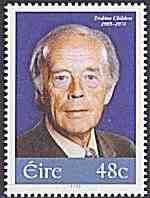 Erskine Childers was born in London to a Protestant family from Wicklow in Ireland. After the First World War his family moved back to Wicklow. His father's ancestry was Irish while his mother, Mary Alden Childers, was from Boston and whose family had arrived in America aboard the Mayflower. Together they were ardent opponents of the Anglo-Irish Treaty which partitioned much of Ulster from the rest of Ireland. They were stringent Republicans.
Erskine Childers was born in London to a Protestant family from Wicklow in Ireland. After the First World War his family moved back to Wicklow. His father's ancestry was Irish while his mother, Mary Alden Childers, was from Boston and whose family had arrived in America aboard the Mayflower. Together they were ardent opponents of the Anglo-Irish Treaty which partitioned much of Ulster from the rest of Ireland. They were stringent Republicans.
The young Childers was educated in History at Cambridge in England and was only 16 years of age when his father was executed by the new Free State Government, on charges relating to gun possession. After he graduated from College he worked for a time in Paris before taking up a position at Eamon deValera's newspaper 'The Irish Press' in 1931. In 1938 he was elected to the Irish Parliament for the first time. He served as the Minister for Posts and Telegraphs in 1951, Minister for Lands in 1957, and as Minister for Health in the Jack Lynch Government, becoming Tanaiste in 1969. He supported Jack Lynch's condemnation of the violence in Northern Ireland and also supported the proposal of Ireland joining the EEC (now the European Union). He was an outspoken critic of Charles Haughey in the aftermath of the 'Arms Crisis' when Haughey was accused of attempting to import arms for the Provisional IRA, a charge he was later acquitted of. He was nominated for President by Eamon deValera who pressured the then Taoiseach Jack Lynch to put him forward as the Fianna Fail candidate. Having been educated in England and a Protestant he was not expected to defeat the Fine Gael candidate Tom O'Higgins who had only narrowly been defeated by deValera in the 1966 Presidential election. Despite these apparent disadvantages he campaigned with vigour, proving his wide popularity and support and won the Presidency by a small margin in a big political upset. As President he clashed with the Fine Gael Taoiseach Liam Cosgrave. Childers had wanted to make the role of President of Ireland more open and accessible to the people. Cosgrave may have viewed such an expansion of the role of President as a threat to his own power and position and blocked his initial attempt to establish a think-tank within the Irish Parliament to plan the future of the country. Cosgrave briefed Childers on national matters only about once every six months, a far cry from the once-a-month updates of previous Presidencies. Childers was thus somewhat isolated from the Fine Gael Government of the time. His attempts to reform the Presidency having been thwarted he instead embarked on a series of official visits and speeches. The strain of his engagements must have taken their toll as he suffered a heart attack in November 1974 and died in the Mater Hospital in Dublin. Such was the popularity of Erskine Childers and his wife Rita that a plan was hatched by Cosgrave to appoint Rita Childers as President by acclamation. Initially the Fianna Fail leader Jack Lynch agreed but later withdrew his support for the plan when details of it emerged in the press. Attorney General and Chief Justice, Cearbhall Ó Dálaigh, was nominated as the next President instead. |

|
||||

View the Archive of Irish Phrases here: http://www.ireland-information.com/irishphrases.htm |

The winner was: dshaw63@msn.com who will receive the following: A Single Family Crest Print (usually US$24.99) Send us an email to claim your print, and well done! Remember that all subscribers to this newsletter are automatically entered into the competition every time. I hope that you have enjoyed this issue! 
by Michael Green, Editor, The Information about Ireland Site. http://www.ireland-information.com Contact us Google+ (C) Copyright - The Information about Ireland Site, 2018. 17 Páirc Ghrainbhil, Carraig Dubh, Contae Baile Átha Cliath, Ireland Tel: 353 1 2893860 |

MARVELOUS GIFTS FOR ANY OCCASION FREE DELIVERY TO YOUR DOOR 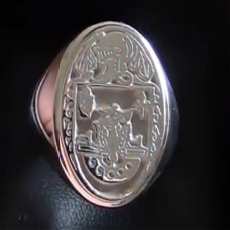
BIG REDUCTIONS! Stunning Family Crest Signet and Seal Rings 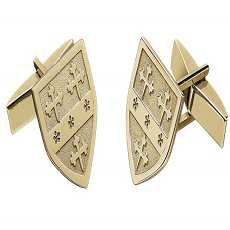
DISCOUNTED FOR A LIMITED TIME Elegant Cufflinks 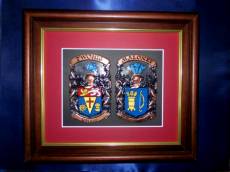
Incredible Family Crest Plaques Made in Ireland 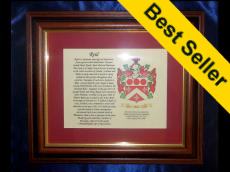
Superior Framed Family Crest Parchments 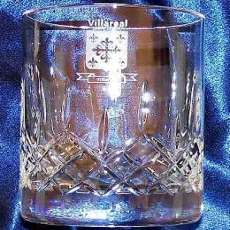
Gorgeous Glistening Galway Crystal 'Your-Name' Old Irish Sign NEW DESIGNS! 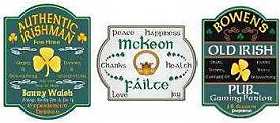
From US$34.99 - Free Delivery 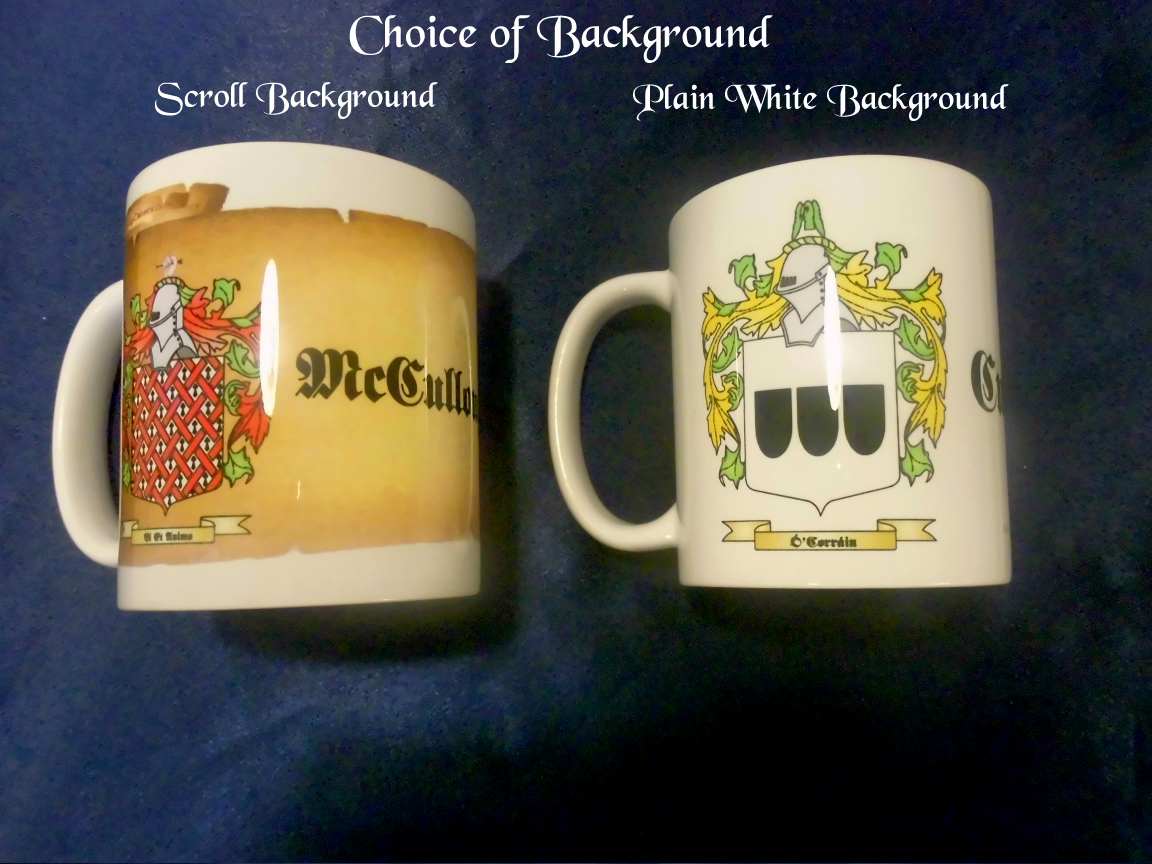
New Designs available on our Coffee Mugs 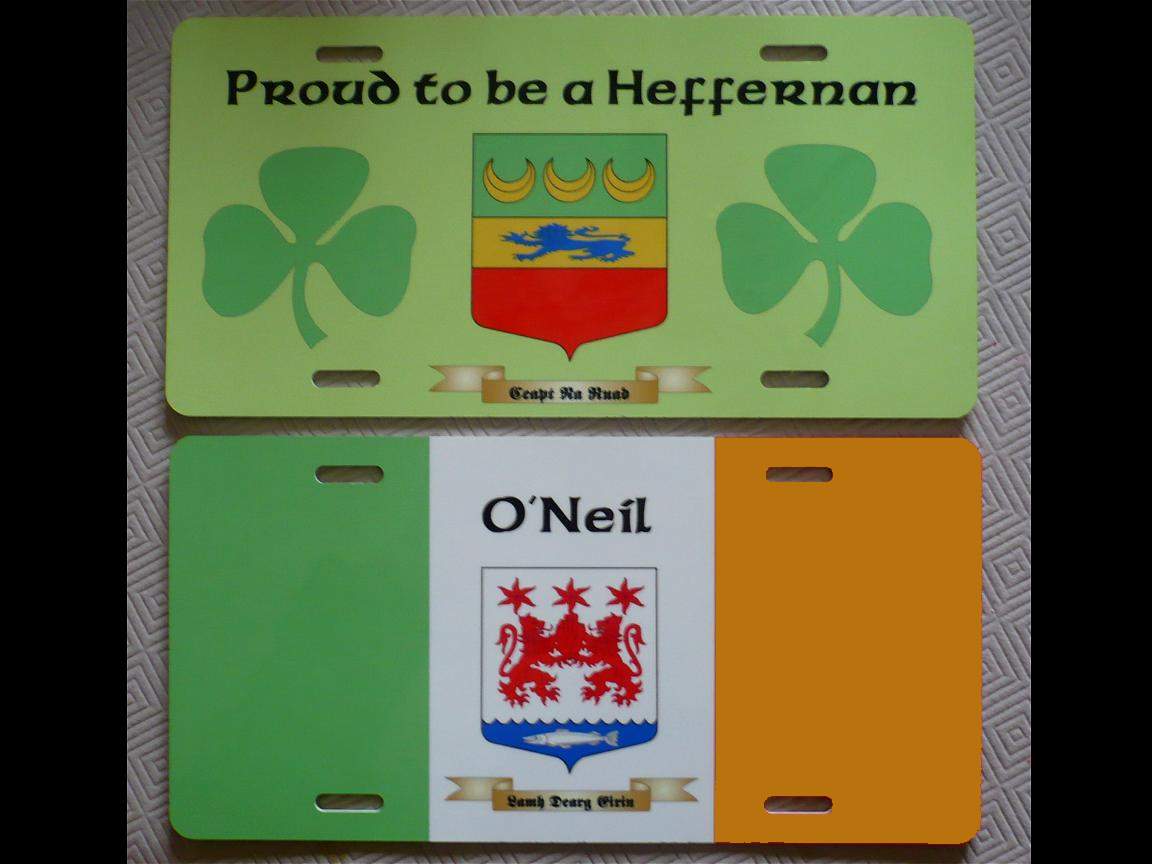
Personalized Licence Plate 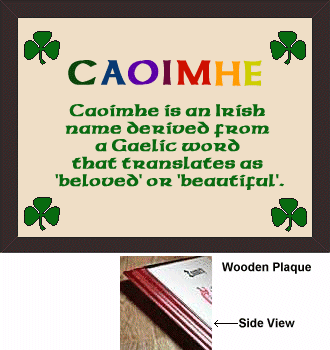
Personalized First Name Plaque. Great for Kids! 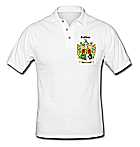
'Your-Name' Polo & Tee Shirts 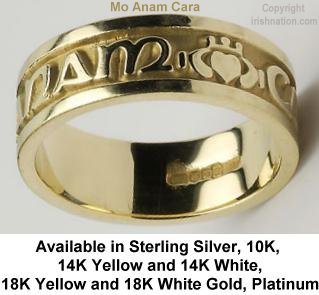
From US$69 Delivered BIG REDUCTIONS! Stunning Engraved Rings from Ireland with Irish Language Phrases. Mo Anam Cara: My Soul Mate Gra Dilseacht Cairdeas: Love, Loyalty, Friendship Gra Go Deo: Love Forever Gra Geal Mo Chroi: Bright Love of my Heart SEE MORE GREAT OFFERS AND DISCOUNTS AT: IRISHNATION.COM FREE DELIVERY FOR A LIMITED TIME! |



